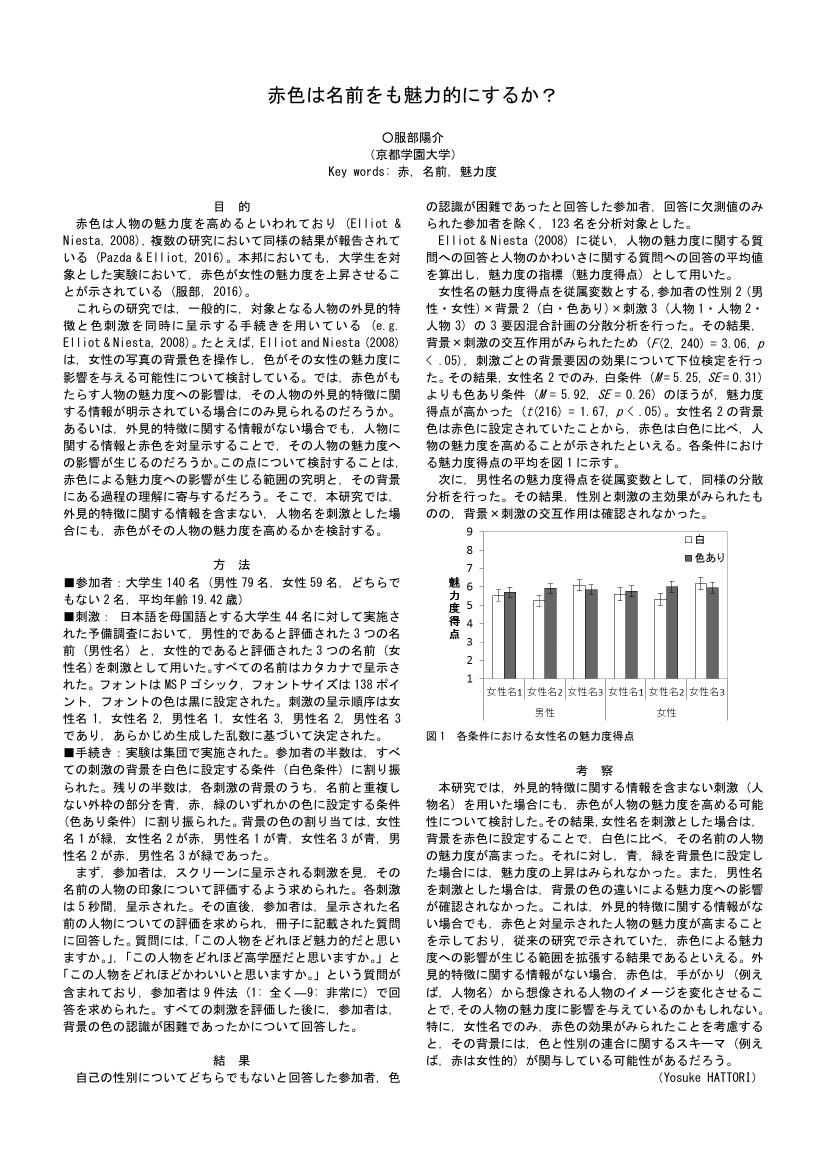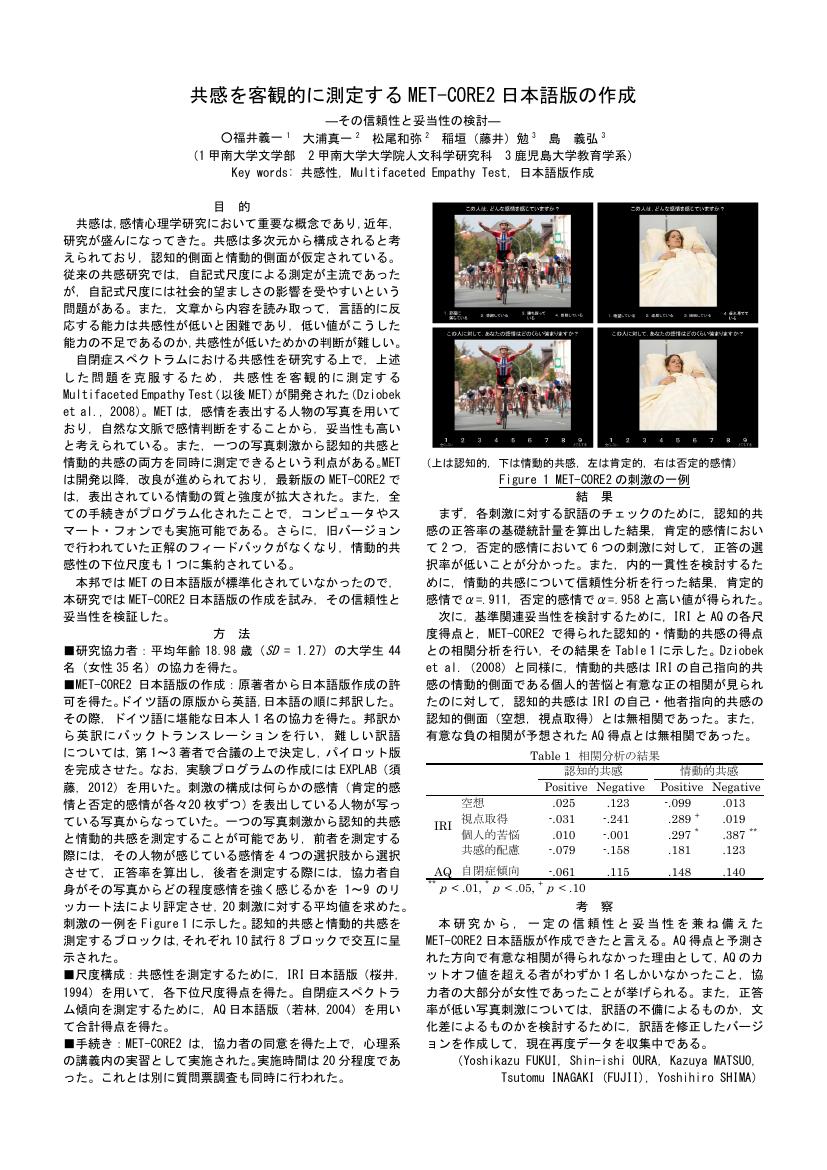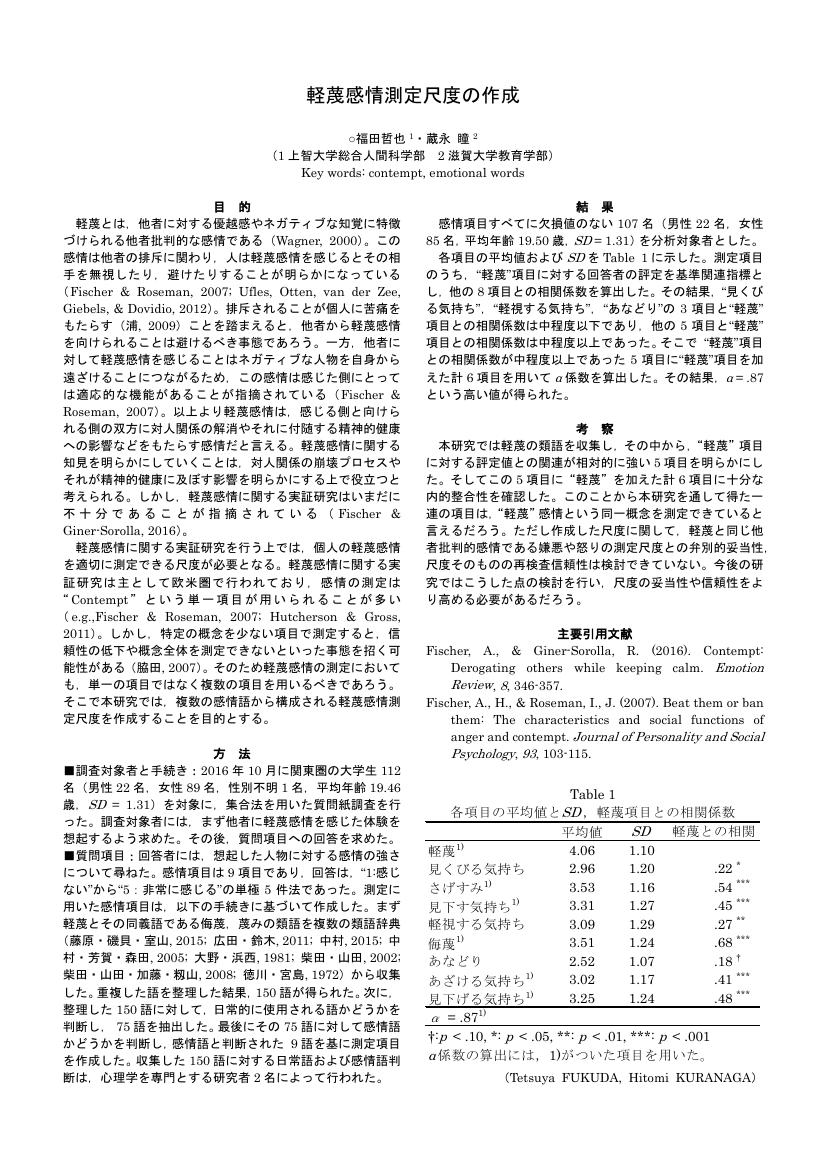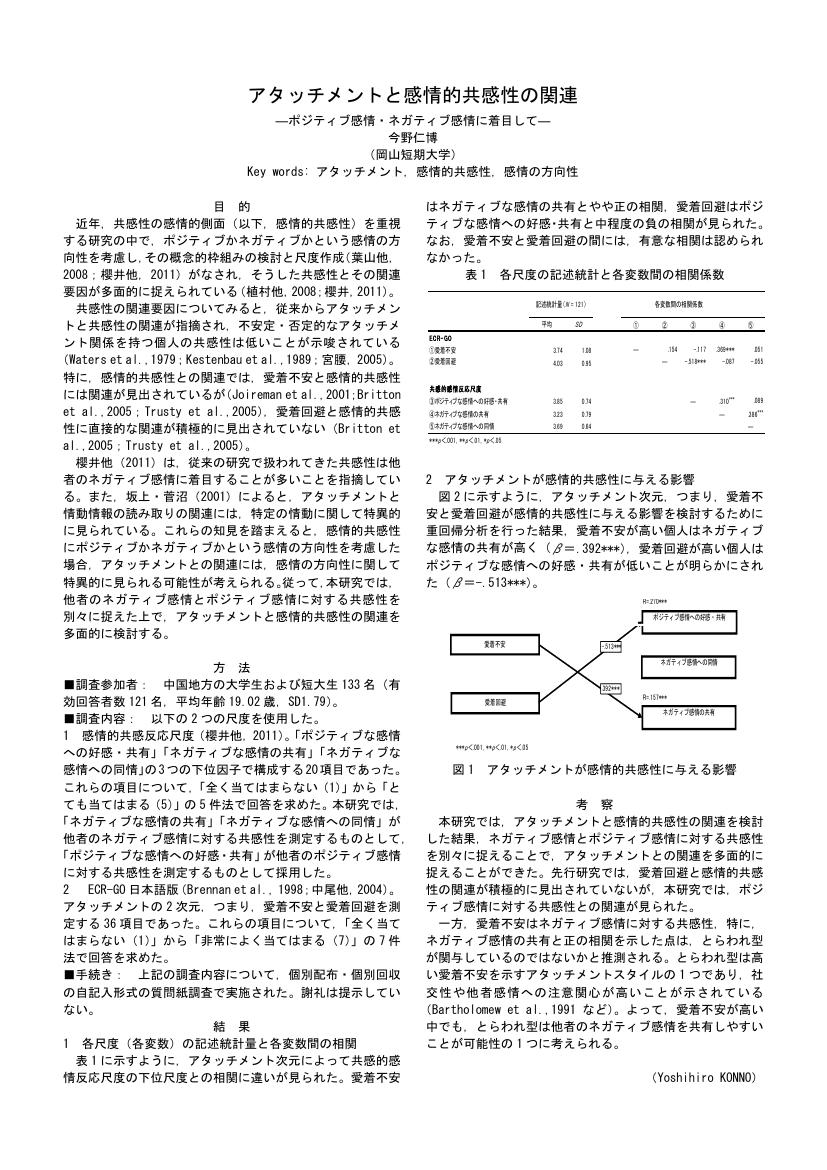1 0 0 0 OA 身体的清潔さ,敏感さ,高揚感と心理的態度との関係
- 著者
- 上原 智香子
- 出版者
- 日本感情心理学会
- 雑誌
- 感情心理学研究 (ISSN:18828817)
- 巻号頁・発行日
- vol.25, no.Supplement, pp.ps46, 2017 (Released:2017-11-28)
- 参考文献数
- 1
1 0 0 0 OA 赤色は名前をも魅力的にするか?
- 著者
- 服部 陽介
- 出版者
- 日本感情心理学会
- 雑誌
- 感情心理学研究 (ISSN:18828817)
- 巻号頁・発行日
- vol.25, no.Supplement, pp.ps55, 2017 (Released:2017-11-28)
1 0 0 0 OA 共感を客観的に測定するMET-CORE2日本語版の作成
1 0 0 0 OA 尊敬の心理学的特徴に関する分析
- 著者
- 蔵永 瞳 樋口 匡貴
- 出版者
- 日本感情心理学会
- 雑誌
- 感情心理学研究 (ISSN:18828817)
- 巻号頁・発行日
- vol.21, no.3, pp.133-142, 2014-05-01 (Released:2014-09-11)
- 参考文献数
- 25
- 被引用文献数
- 4 1
To investigate the psychological characteristics of respect, 214 undergraduate students were asked to recall situations in which they respected others. The participants were asked to complete four types of survey items: a free description of the situation, the emotional experience of feeling respect, any feelings of shame, and the physiological reaction of feeling respect for others. Analysis showed that situations feel respect could be classified into four types: respect for others who have no interaction with the surveyed participant (e.g., a baseball player or architect), respect for superiors (e.g., a teacher, parent, or senior), respect for peers (e.g., a friend or class mate), and respect for junior peers (e.g., a younger member of a club). Further, factor analysis revealed two distinct emotional experiences of respect: adoration and awe. Correlation analysis showed that adoration was indicative of a self-reported sympathetic nervous reaction, and awe was indicative of a self-reported parasympathetic nervous reaction. In addition, the linkage between respect and shame differed by type of situation. For example, awe was positively associated with shame only in cases of respect for superiors or peers.
1 0 0 0 OA 民事紛争のウェブ相談における感情
- 著者
- 荒川 歩
- 出版者
- 日本感情心理学会
- 雑誌
- 感情心理学研究 (ISSN:18828817)
- 巻号頁・発行日
- vol.20, no.Supplement, pp.5, 2013 (Released:2013-04-10)
1 0 0 0 OA 論文撤回のお知らせ
- 出版者
- 日本感情心理学会
- 雑誌
- 感情心理学研究 (ISSN:18828817)
- 巻号頁・発行日
- vol.23, no.2, pp.95, 2016-01-30 (Released:2016-04-12)
1 0 0 0 OA 撤回:内的作業モデルが情動認知に与える影響
1 0 0 0 OA 文学に見る人種偏見
- 著者
- 米山 正文
- 出版者
- 日本感情心理学会
- 雑誌
- エモーション・スタディーズ (ISSN:21897425)
- 巻号頁・発行日
- vol.1, no.1, pp.36-41, 2015-10-01 (Released:2017-04-24)
- 参考文献数
- 13
This paper aims to elucidate how antebellum American fiction addresses the modern ideology of race. It examines how African-American characters are represented in The Yemassee (Simms, 1835), Westward Ho! (Paulding, 1832), Swallow Barn (Kennedy, 1832), Uncle Tom’s Cabin (Stowe, 1852) and The Red Rover (Cooper, 1828). It contends that unlike the other novels, The Red Rover resists racial prejudices by focusing on the comradeship among sailors of different color.
1 0 0 0 共感性は攻撃性の抑制要因として機能するか
1 0 0 0 OA 日英比較研究からみた日本のいじめの諸特徴
- 著者
- 金綱 知征
- 出版者
- 日本感情心理学会
- 雑誌
- エモーション・スタディーズ (ISSN:21897425)
- 巻号頁・発行日
- vol.1, no.1, pp.17-22, 2015-10-01 (Released:2017-04-24)
- 参考文献数
- 21
- 被引用文献数
- 3
This paper aimed to give an overview of a series of cross-national studies on children’s perception and understanding of bullying in England and ijime in Japan, and to see the nature and the characteristics of ijime and its possible social and cultural background factors. Ijime in Japan, compared to bullying in Western countries, is often considered to be more indirect in nature, and often conducted as a group aggression by victims’ classmates or someone victims know very well. Although students in both countries had similar perceptions of typical characteristics of bullies and victims, and many students had anti-bully and pro-victim attitudes, victim-blaming tendency appeared to be more salient in Japan. These characteristics may partly be explained by the school systems and pupils' friendship formations within the system in each country. Compared to English pupils, Japanese pupils formed their friendships on the basis of the class they belonged to, and spent most time with them in the classroom. Thus, more class-based prevention and intervention approaches would be necessary.
1 0 0 0 OA 「苦しい」に関する感情体験の特性
- 著者
- 鈴木 賢男
- 出版者
- 日本感情心理学会
- 雑誌
- 感情心理学研究 (ISSN:18828817)
- 巻号頁・発行日
- vol.18, no.3, pp.196, 2011-05-15 (Released:2011-09-01)
1 0 0 0 OA 軽蔑感情測定尺度の作成
1 0 0 0 OA ポジティブ情動喚起刺激の不確実性と重要性が情動持続に与える影響
- 著者
- 金子 迪大 堀毛 一也
- 出版者
- 日本感情心理学会
- 雑誌
- 感情心理学研究 (ISSN:18828817)
- 巻号頁・発行日
- vol.24, no.1, pp.33-41, 2016-11-30 (Released:2017-02-22)
- 参考文献数
- 30
This study examined the effects of uncertainty and importance of a positive emotional event on the duration of emotion. We hypothesized that (i) uncertainty reduces the rate of decreasing emotional reaction by extending the duration of attention to the event, and (ii) importance increases the initial emotional reaction but does not reduce the decreasing rate. Ninety-two participants answered an ostensible ability test and received bogus positive feedback as emotional manipulation. Next, uncertainty and importance of feedback were manipulated across three conditions. Participants in the uncertain condition were told that the ability measured would be disclosed after the experiment. In the important/unimportant conditions, participants were instructed that an important/unimportant ability had been measured. Next, participants reported on their emotional state and performed a filler task for five minutes, after which they reported on their emotional state again. Results showed that participants in the uncertain and important conditions experienced more increased initial emotional reaction and longer duration of emotion than those in the unimportant condition. Although the effect of importance was consistent with the hypothesis, the effect of uncertainty was not.
1 0 0 0 OA 自己反すうと自己内省が社交不安に及ぼす影響─4週間の間隔を空けた縦断的検討─
- 著者
- 小澤 崇将 長谷川 晃
- 出版者
- 日本感情心理学会
- 雑誌
- 感情心理学研究 (ISSN:18828817)
- 巻号頁・発行日
- vol.25, no.1, pp.17-25, 2017-10-31 (Released:2018-03-16)
- 参考文献数
- 28
- 被引用文献数
- 3
Possible effects of two forms of self-focus driven by different motives, self-rumination and self-reflection, on symptoms of social anxiety, were investigated. Undergraduates (N=200) completed the Rumination–Reflection Questionnaire, Liebowitz Social Anxiety Scale (LSAS), Short Fear of Negative Evaluation Scale (SFNE), and Interpersonal Stress Event Scale on two occasions with an interval of four weeks. Results indicated that self-rumination in the first session significantly predicted the subsequent increase in fear of negative evaluation assessed with the SFNE, even after controlling for the intensity of initial symptoms. This finding is consistent with previous studies showing that self-focus is a major factor in maintaining social anxiety. On the other hand, self-reflection in the first session predicted a decrease in subsequent avoidance behaviors from social situations assessed with the LSAS. These findings indicate that self-focus motivated by curiosity or an epistemic interest in the self might enable people to reconsider tendencies of avoiding social situations, which may prevent behavioral tendencies of avoidance. These findings suggested that motivations driving self-focus could determine its effects on the symptoms of social anxiety.
1 0 0 0 OA 負の感情発生メカニズムとしての相対的剝奪
- 著者
- 石田 淳
- 出版者
- 日本感情心理学会
- 雑誌
- エモーション・スタディーズ (ISSN:21897425)
- 巻号頁・発行日
- vol.3, no.1, pp.25-29, 2017-10-01 (Released:2018-01-10)
- 参考文献数
- 27
This article tries to outline the positioning of emotions in sociological action theories, and further explore possible development of explanation of social phenomena incorporating psychological generation mechanism of emotions, with relative deprivation theory as an example. In sociology, emotions, in particular negative emotions which would lead to social change, cannot be ignored as “live coals” which affects actor’s action tendency and prepares potential actions. As shown in the application of the Yitzhaki (1979) theory, micro-macro-theoretic models explaining macro state change via micro psychological generating mechanisms of emotions has great potential in predicting the dynamics of social change.
1 0 0 0 OA 感情制御を目的とした対人交流方略と精神的健康との関連
- 著者
- 浦野 由平
- 出版者
- 日本感情心理学会
- 雑誌
- 感情心理学研究 (ISSN:18828817)
- 巻号頁・発行日
- vol.24, no.3, pp.101-111, 2017-05-15 (Released:2017-06-13)
- 参考文献数
- 37
- 被引用文献数
- 2
We developed a measure regarding interpersonal strategies of emotion regulation, and asked 310 students to report on their daily use. As a result, we gained 7 interpersonal strategies: making others uncomfortable, doing something fun together, making a joke, ruminating together, reassurance seeking, problem solving together, and complaining. The new measure demonstrated appropriate psychometric properties. We found significant gender differences on strategy use and relationships between measures of mental health. Lastly, we discussed the limitations of the current study, and prospects for future studies.
1 0 0 0 OA 赤は女性をより魅力的にするか
- 著者
- 服部 陽介
- 出版者
- 日本感情心理学会
- 雑誌
- 感情心理学研究 (ISSN:18828817)
- 巻号頁・発行日
- vol.24, no.Supplement, pp.ps33, 2017 (Released:2017-04-03)
1 0 0 0 OA LINE上のコミュニケーションはユーザーにどう捉えられているのか
1 0 0 0 OA アタッチメントと感情的共感性の関連
- 著者
- 今野 仁博
- 出版者
- 日本感情心理学会
- 雑誌
- 感情心理学研究 (ISSN:18828817)
- 巻号頁・発行日
- vol.22, no.Supplement, pp.28-28, 2014 (Released:2014-12-05)
1 0 0 0 OA 顔文字付きメールが受信者の感情緩和に及ぼす影響
- 著者
- 荒川 歩 竹原 卓真 鈴木 直人
- 出版者
- 日本感情心理学会
- 雑誌
- 感情心理学研究 (ISSN:18828817)
- 巻号頁・発行日
- vol.13, no.1, pp.22-29, 2006-03-30 (Released:2010-01-15)
- 参考文献数
- 13
- 被引用文献数
- 2 1
This research compared the effects of messages with and without emoticons from a familiar friend on the reduction of intensity of emotions, the relationship between changes in emotions, and the impact of emoticons on text messages. In particular, the effect of messages with one of five emoticons { (^_^) (;_;) (>_<) (^_^;) m(_ _)m } and messages with no emoticons, on four emotional scripts, happy, sad, angry, and anxious, were compared. Using their own cell phones, university students (n=33) participated in this study by reporting emotional intensity when they were in each script. They again reported emotional intensity after receiving a text message with emoticons from a familiar friend. Results indicated that (1) messages with emoticons reduced the intensity of the receiver's negative emotions in comparison to messages without emoticons; and (2) when receivers were feeling angry or happy, a significant relationship was found between the impact of emoticons and the reduction in the intensity of emotions, expect when receivers were feeling anxious or sad. Results suggest that appropriate selection from emoticons reduces the intensity of the receiver's negative emotions.









